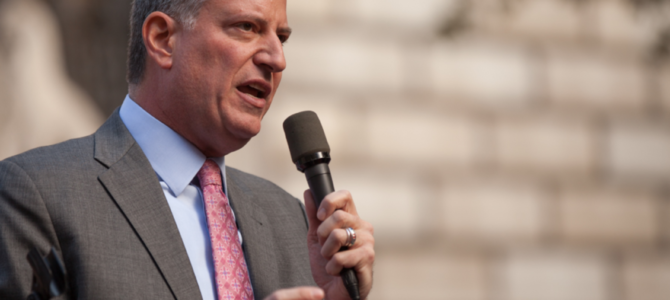New York City Mayor Bill de Blasio bailed out of the 2020 presidential race last week, announcing on MSNBC’s “Morning Joe” Friday that it was “clearly not my time.”
“I’m going to end my presidential campaign, continue my work as mayor of New York City, and I’m going to keep speaking up for working people,” de Blasio said.
But what has de Blasio done in New York City? In May, the month de Blasio launched his presidential campaign, the New York Post reported that the mayor logged a mere seven-hour work month, showing up to his office in City Hall just six times. And while 72,000 residents underwent a blackout in July, de Blasio was campaigning in Iowa.
Now de Blasio faces a series of problems to address in the city for the remainder of his term, including crumbling infrastructure, a struggling police force, and a crisis of homelessness, all of which long preceded the start of the mayor’s presidential run.
In recent years, de Blasio has feuded with Gov. Andrew Cuomo over who bears responsibility for the city’s rapidly deteriorating transportation system. The city’s subway now features frequent delays and has undergone a series of disasters, prompting authorities to request funding for a $54 billion plan to rehabilitate the system.
The city’s taxi drivers are also facing a crisis after losing some drivers who struggled to pay off loans for their taxi medallions, which the city profited from as Uber and other ride-sharing companies began to dominate the market, in a series of suicides. A New York Times investigation revealed, however, that the problems plaguing the city’s cab drivers were not a result of Uber and Lyft but instead were caused by powerful industry leaders driving up the cost of the city’s taxi permits.
New York City’s police force has also seen a similar trend, as nine officers loss their lives to suicide this year, setting a tragic new record. In a city that has long struggled with crime and law enforcement, de Blasio has received flak from both advocates of criminal justice reform and members of his own police force. The New York Times reports that an average of five police officer suicides have occurred in the city each year since 2014, as New York lags behind other cities in expanding effective mental health initiatives.
Criminal justice reform was also an issue for de Blasio on the presidential campaign trail. De Blasio initially opposed the firing of Daniel Pantaleo, the officer who killed Eric Garner in 2014 with a chokehold that led to nationwide protesting, inspiring the “I can’t breathe” mantra of the Black Lives Matter movement. Under the pressures of a national political campaign in a party shifting increasingly left, however, de Blasio changed course and pledged justice for Garner at the July Democratic primary debate just weeks before Pantaleo was fired, infuriating law enforcement.
De Blasio is also returning home to a city with a growing crisis of homelessness, with the New York Times reporting an estimated 78,000 people without a home. Meanwhile, public housing conditions in the city have become so bad, the federal government has threatened a complete takeover of the New York City Housing Authority. While the city reached an agreement with federal authorities to cede some control of the agency, the city admits it is still noncompliant with several federal regulations, and de Blasio’s plan to raise money for the problem by working with developers to create mixed-income housing on underused public land has stalled.
The New York City Housing Authority says it needs $32 billion for repairs as 176,000 apartments continue to experience heat and hot water outages coupled with growing mold, outdated appliances, and collapsing roofs.
De Blasio was always a long-shot candidate for president since entering the race late in May after more than 20 other major candidates had already announced. Few New Yorkers wanted the mayor to enter the race, and he never gained anywhere close to enough support in the presidential polls to land a spot at the third or fourth Democratic debates.
But now that de Blasio is no longer running for president, the mayor will have more time to hide in the city’s Gracie Mansion and log more seven-hour work months rather than face the serious problems that have plagued the city for years.









